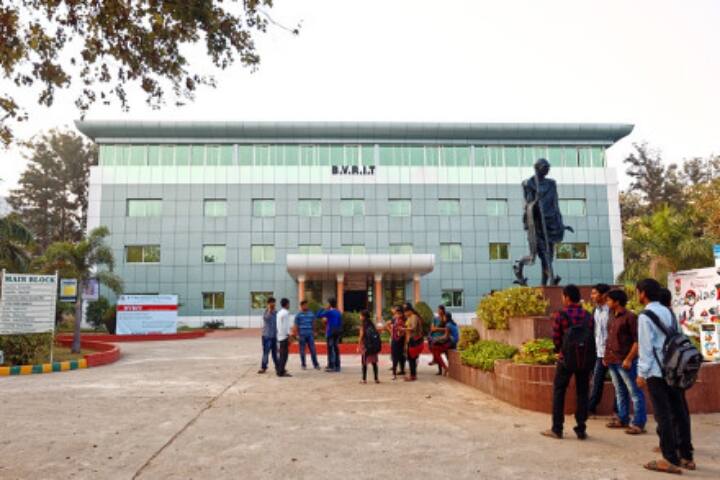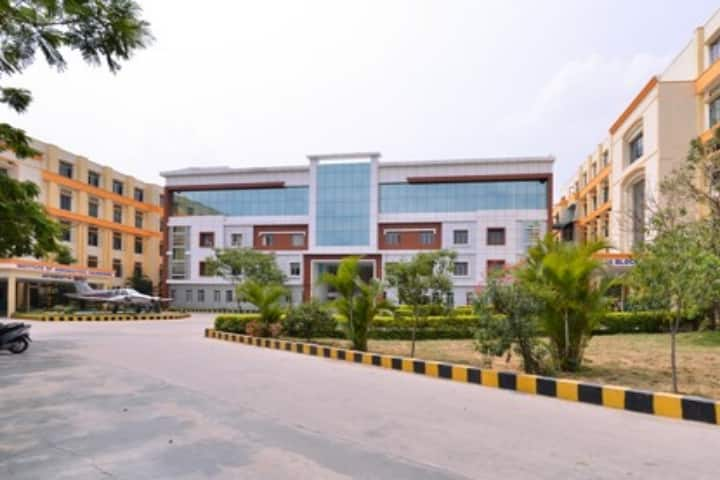
Embedded Systems Course Details - Fees, Subjects, Syllabus, Duration, Eligibility, Career Scope
Degrees offered: M.E /M.Tech., M.Sc., B.E /B.Tech, B.Sc., M.S
What is Embedded Systems
Embedded Systems course is one of the most sought after courses that provide a detailed understanding in embedded systems and their components, and their applications across various industries. Embedded systems courses develop practical skills in designing and implementing embedded systems, setting the stage for a rewarding career in this exciting domain. Embedded Systems course helps to explore the basics of embedded systems, their characteristics, and importance in modern technology. Embedded systems courses provide a detailed understanding of the programming languages used in embedded systems, such as C and C++, along with software design principles and real-time operating systems.
Various colleges and universities offer different degrees in the Embedded Systems course. In this article, we will provide a comprehensive overview of the Embedded Systems Course, including Embedded Systems syllabus, eligibility criteria for undergraduate and postgraduate degree programmes, Embedded Systems career options, fees, salary and college list.
Highlight: Embedded Systems
Branch Name | Embedded Systems |
Degree | |
Duration | UG: 4 years PG: 2 years |
Eligibility | UG: 10+2 PG: Bachelor’s degree |
Admission Process | Admission Examination/ Direct Admission |
Top Entrance Exams | JEE Main, JEE Advanced, BITSAT, GATE |
Average Course Fees | Rs. 2 lakhs |
Top Colleges | Delhi Technological University, Delhi, Osmania University, Hyderabad, Indian Institute of Technology Patna, Indian Institute of Technology Kharagpur, National Institute of Technology Warangal |
Career Options | Embedded Systems Engineer, IoT Developer, Robotics Engineer, Computer Vision Engineer, Embedded Systems Test Engineer |
Average Salary | Rs. 4 LPA |
Recruiting Companies | Intel Corporation, Qualcomm Inc., Robert Bosch GmbH, Honeywell International Inc, Texas Instruments Inc |
Specialisation or Similar Ones
Embedded Systems course is a specialised field of study that combines computer hardware and software engineering to develop complex systems. There are several Embedded Systems specialisations within this field that students can choose to focus on, depending on their interests and career goals. Here are some of the key Embedded Systems specialisations:
Real-Time Operating Systems (RTOS)
Digital Signal Processing (DSP)
Internet of Things (IoT)
Computer Vision
Robotics
Below, we have mentioned some of the major degree programmes in Embedded Systems and related course:
B.Tech Robotics and Embedded Systems | |
B.Tech Embedded Systems | M.Tech Embedded Systems |
PGD Embedded Systems | |
B.Tech ECE specialisation in Embedded Systems and VLSI Design | MS Embedded Systems |
ME Embedded Systems and Computing | ME Embedded Systems |
Ph.D Embedded Systems |
Top Embedded Systems Colleges in India
Embedded Systems courses are offered by a number of public and private universities and colleges. Embedded Systems fee is mostly based on the degree programme which is chosen by the student, type and location of the college. Some of India's top Embedded Systems colleges are listed in the table below.
Colleges | Fees |
Rs. 1.80 Lakhs | |
Rs. 3.80 Lakhs | |
Vignan's Foundation for Science Technology and Research, Guntur | Rs. 2.10 Lakhs |
Rs. 2.55 Lakhs | |
- | |
International Institute of Information Technology, Hyderabad | - |
- | |
Shanmugha Arts Science Technology Research and Academy, Thanjavur | Rs. 2.98 Lakhs |
Dhirubhai Ambani Institute of Information and Communication Technology, Gandhinagar | Rs. 2.68 Lakhs |
Rs. 1.20 Lakhs |
Top Private Embedded Systems Colleges in India
Embedded Systems courses are offered by a number of private universities and colleges in India. Admission is offered based on previous academic achievements and the results of the entrance examinations. The table below lists some of India's best private Embedded Systems colleges.
Colleges | Fees |
Dr MGR Educational and Research Institute, Chennai | Rs. 1.80 Lakhs |
Vellore Institute of Technology, Vellore | Rs. 3.80 Lakhs |
Vignan's Foundation for Science Technology and Research, Guntur | Rs. 2.10 Lakhs |
Koneru Lakshmaiah Education Foundation, Guntur | Rs. 2.55 Lakhs |
International Institute of Information Technology, Hyderabad | - |
BITS Pilani, Goa Campus | - |
Shanmugha Arts Science Technology Research and Academy, Thanjavur | Rs. 2.98 Lakhs |
Dhirubhai Ambani Institute of Information and Communication Technology, Gandhinagar | Rs. 2.68 Lakhs |
- |
Top Government Embedded Systems Colleges in India
In India, there are many government universities and colleges that offer Embedded Systems courses. Prior academic achievements and entrance examination scores are used to determine admission for Embedded Systems courses. India's best government Embedded Systems colleges are listed in the table below.
Colleges | Fees |
Jawaharlal Nehru Technological University, Hyderabad | - |
Kakatiya University, Warangal | Rs. 1.20 Lakhs |
Rs. 3.31 Lakhs | |
Rs. 1.10 Lakhs | |
Rs. 60,150 | |
Rs. 45,850 | |
Rs. 2.68 Lakhs | |
Rs. 1.70 Lakhs | |
Rs. 1.78 Lakhs | |
- |
Eligibility Criteria (UG & PG) of Embedded Systems
To pursue an Embedded Systems course, students need to have a strong background in electronics, computer science, or a related field. The academic qualifications required for enrolling in both the undergraduate and postgraduate Embedded Systems course may vary from one institution to another. For the undergraduate degree programme, students need to complete 10+2 in Science stream. After completing an undergraduate degree, students can pursue a postgraduate degree in Embedded Systems or in similar courses.
Eligibility Criteria UG Courses
To pursue an Embedded Systems course at the undergraduate level in India, students should have completed your 10+2 with Physics, Chemistry, and Mathematics as core subjects. Students should secure a minimum of 50 per cent marks in the 10+2 examination.
Students need to complete 10+2 in Science stream with Physics, Chemistry and Mathematics as major subjects.
Candidates should have at least 50 per cent marks to be eligible for the bachelor’s degree programme.
Admission to the bachelor’s degree programmes is based on direct admission as well as on the entrance examinations.
Top Entrance Exams for UG Courses
JEE Main: JEE Main is a national-level engineering entrance exam conducted by the National Testing Agency (NTA) for admission into various undergraduate engineering courses, including Embedded Systems, in Indian Institutes of Technology (IITs), National Institutes of Technology (NITs), and other top engineering colleges. The exam is conducted twice a year in January and April.
JEE Advanced: JEE Advanced is a national-level engineering entrance exam conducted by the National Testing Agency (NTA) for admission into various undergraduate engineering courses, including Embedded Systems, in Indian Institutes of Technology (IITs), National Institutes of Technology (NITs), and other top engineering colleges in India. The seats are distributed on the basis of AIR (All India Rank) achieved by students.
BITSAT: BITSAT is a computer-based online entrance exam conducted by the Birla Institute of Technology and Science (BITS) for admission into its integrated first-degree programs, including Embedded Systems. The exam is usually held in May.
Eligibility Criteria PG Courses
To pursue a Master's degree in Embedded Systems in India, students should have a Bachelor's degree in Electronics, Computer Science, or in a related field. Most institutions require a minimum of 50 per cent marks in the undergraduate degree programme.
Students need to visit the official website of the exam and fill out the application form.
Students should also pay a registration fee, which varies depending on the exam.
Students need to appear for the entrance examination for admission in the postgraduate degree programme in Embedded Systems.
Top Entrance Exams for PG Courses
GATE: GATE is a national-level entrance exam conducted by the Indian Institute of Science (IISc) and seven Indian Institutes of Technology (IITs) for admission into various postgraduate engineering courses, including Embedded Systems. The exam is usually held in February.
College Predictors VIEW ALL
Scope of Embedded Systems in India and Abroad
With the rapid advancements in technology, the demand for skilled professionals in specialised fields like Embedded Systems has surged in India. Completing an Embedded Systems Course not only equips graduates with the expertise needed to thrive in this domain, but also presents a range of lucrative career opportunities.
The job market for Embedded Systems professionals in India is thriving, with opportunities available across various industries, such as automotive, consumer electronics, aerospace, medical devices, and industrial automation. India's push for indigenous technology development and the government's 'Make in India' initiative have further fueled the demand for skilled Embedded Systems professionals.
The career prospects for Embedded Systems course graduates in India are promising, with a wealth of opportunities available across multiple industries. By acquiring the necessary skills and pursuing an embedded systems course with placement, graduates can secure a successful and rewarding career in the rapidly growing field of Embedded Systems.
Students also liked
Course Fees Embedded Systems
| Minimum Fees | Maximum Fees | |||
|---|---|---|---|---|
| Private | Government | Private | Government | |
| UG | ||||
| PG | ||||
Course Subjects
For students who are interested in pursuing undergraduate and postgraduate degrees in Embedded Systems, then it is important to have a clear understanding of the syllabus for the Embedded Systems course. Some of the topics of the undergraduate and postgraduate degree of Embedded System course are discussed below.
Characteristics of Embedding Computing Applications | Basic Embedded Processor/Microcontroller Architecture |
Timers and Counters | DMA Controllers |
Message-Based Communication | Interfacing Protocols |
Context Switching | Real-Time Transaction Files |
Device Drivers | A/D and D/A Converters |
| System Design using Embedded Processors | Embedded Programming |
| Embedded OS & RTOS | Multimedia Compression Techniques |
| Electronic Packaging | VLSI Signal Processing |
Careers in Embedded Systems
Embedded Systems is a rapidly growing field, and there are a wide range of career opportunities available for those who have completed a course in this area. Here are some of the top career options available in India for Embedded Systems graduates, along with their corresponding average salaries:
Embedded Systems Engineer | An Embedded Systems Engineer is responsible for designing, developing, and testing embedded systems for various applications such as automotive, aerospace, medical devices, and more. He or she typically has expertise in microcontroller programming, real-time operating systems, and digital signal processing. |
IoT Developer | An IoT Developer is responsible for designing and developing IoT systems using microcontrollers, wireless communication protocols, and cloud computing. He or she typically has expertise in programming languages such as Python, C, and Java. |
A Robotics Engineer is responsible for designing and developing robotic systems for various applications such as manufacturing, automation, and exploration. He or she has expertise in microcontroller programming, sensors, and actuators. | |
Computer Vision Engineer | A Computer Vision Engineer is responsible for developing algorithms for image and video processing, object detection, and recognition. He or she should have the knowledge of programming languages such as Python, C++, and MATLAB. |
Embedded Systems Test Engineer | An Embedded Systems Test Engineer is responsible for testing embedded systems to ensure they meet the required specifications and standards. He or she has the knowledge of test automation, scripting, and debugging. |
Upcoming trends
Embedded Systems is an ever-evolving field that is constantly being influenced by new technological advancements and changing industry demands. Here are some of the most trending topics in Embedded Systems from an SEO perspective:
Internet of Things (IoT): IoT is a rapidly growing field that is driving innovation in the Embedded Systems industry. It involves connecting everyday devices to the internet and enabling them to communicate with each other, creating a network of interconnected devices. This has led to a surge in demand for IoT devices, which in turn has increased the demand for Embedded Systems engineers with expertise in IoT development.
Artificial Intelligence (AI): AI is a rapidly growing field that has significant implications for the Embedded Systems industry. AI algorithms can be used to develop smarter and more efficient Embedded Systems applications, such as those used in autonomous vehicles, drones, and medical devices. This has led to an increased demand for Embedded Systems engineers with expertise in AI development.
Robotics: Robotics is an exciting field that is rapidly advancing due to advancements in Embedded Systems technology. Robotics applications include manufacturing, automation, and exploration. There is an increasing demand for Embedded Systems engineers with expertise in robotics development.
Machine Learning: Machine Learning is a rapidly growing field that is transforming the way Embedded Systems applications are developed. Machine Learning algorithms can be used to create smarter and more efficient Embedded Systems applications, such as those used in predictive maintenance and fault detection. There is an increasing demand for Embedded Systems engineers with expertise in machine learning development.
Cybersecurity: Cybersecurity is becoming an increasingly important consideration in the Embedded Systems industry. As Embedded Systems applications become more connected to the internet, they become more vulnerable to cyber-attacks. There is an increasing demand for Embedded Systems engineers with expertise in cybersecurity.
Job Profiles and Top Recruiters
Embedded Systems graduates have a range of job opportunities available to them in India. There are several top recruiters in India that offer employment opportunities to Embedded Systems graduates. Here are some of the potential recruiters to consider:
Intel Corporation
Qualcomm Inc.
Robert Bosch GmbH
Honeywell International Inc.
Texas Instruments Inc.
Average Salary
In the table below, we have mentioned the average salary of the Polymer Chemistry graduates:
Job Profile | Salary (Average) |
Embedded Systems Engineer | Rs. 6 LPA |
IoT Developer | Rs. 5 LPA |
Robotics Engineer | Rs. 7 LPA |
Computer Vision Engineer | Rs. 6 LPA |
Embedded Systems Test Engineer | Rs. 5 LPA |
Note: These salary figures may vary depending on various factors, such as designation, experience, skills, job location.
Required Skillset for Embedded Systems
To pursue a career in Embedded Systems, candidates need to have various skills. In the table below, we have mentioned skills that are required for the Embedded Systems course:
Proficiency in Programming Languages | Understanding of Hardware Components |
Development Tools | Debugging Skills |
Knowledge of Digital Signal Processing | Software Engineering Principles |
Course Curriculum for Embedded Systems
Embedded Systems syllabus covers a range of topics and sub-topics relevant to the field of Embedded Systems, including digital electronics, computer programming, microcontrollers, real-time operating systems, robotics, internet of things, computer vision. Embedded Systems syllabus is designed to provide students with a comprehensive understanding of the principles and practices of Embedded Systems, and prepare them for a successful career in this field. Below, we have mentioned some of the topics that are covered in the Embedded Systems course curriculum.
Computer Networks and Security
Advanced Embedded Systems Design
Embedded Systems Testing and Verification
Advanced Microcontroller Programming
Professional Ethics and Human Values
Entrepreneurship and Intellectual Property Rights
Popular Embedded Systems Entrance Exams in India
Frequently Asked Questions (FAQs)
Question: What are the top recruiting companies that hire Embedded Systems students?
Answer :
The top recruiting companies that hire Embedded Systems students are Intel Corporation, Qualcomm Inc., Robert Bosch GmbH, Honeywell International Inc, Texas Instruments Inc
Question: What are the top career choices for the Embedded Systems students?
Answer :
The top career choices for the Embedded Systems students are Embedded Systems Engineer, IoT Developer, Robotics Engineer, Computer Vision Engineer, Embedded Systems Test Engineer.
Question: What are the skills required for an Embedded Systems course?
Answer :
The skills required for an Embedded Systems course are Proficiency in Programming Languages, Understanding of Hardware Components, Development Tools, Debugging Skills, Knowledge of Digital Signal Processing, Software Engineering Principles.
Question: What are the entrance exams required for Embedded Systems?
Answer :
The entrance exams required for Embedded Systems are JEE Main, JEE Advanced, BITSAT and GATE.
Question: What are the degree programmes for Embedded Systems courses?
Answer :
Some of the degree programmes for Embedded Systems course are B.Tech Robotics and Embedded Systems, M.Tech VLSI and Embedded Systems, B.Tech Embedded Systems, M.Tech Embedded Systems, PGD Embedded Systems, M.Tech Embedded Systems and Internet of Things, B.Tech ECE specialisation in Embedded Systems and VLSI Design, MS Embedded Systems.
Question: What are the benefits of pursuing an Embedded Systems course?
Answer :
Embedded Systems is a rapidly growing field, with high demand for skilled professionals across various industries. Embedded Systems professionals work on a wide range of projects, from designing medical devices to developing autonomous vehicles, which can be both exciting and challenging. Professionals typically earn competitive salaries due to their specialised skills and the demand for their services. With experience, Embedded Systems professionals can take on leadership roles and become experts in their field, leading to career growth opportunities.
Question: Who is an Embedded Systems Analyst?
Answer :
An Embedded Systems Analyst is a professional who specialises in the design, development, and testing of Embedded Systems. They work closely with hardware engineers and software developers to create reliable and efficient Embedded Systems solutions. An Embedded Systems Analyst may also be responsible for troubleshooting and resolving issues in Embedded Systems, as well as optimising their performance.
Question: Is the Embedded Systems course difficult?
Answer :
Embedded Systems can be a challenging field to study and work in, as it requires a strong understanding of both hardware and software. However, with proper training and experience, it can be a rewarding career. It is important to have a solid foundation in programming, computer architecture, and electronics to succeed in this field.
Question: What are some examples of Embedded Systems?
Answer :
There are various examples of Embedded Systems, some of which are: Medical devices such as heart monitors, insulin pumps, and pacemakers are examples of Embedded Systems. Embedded Systems are widely used in the automotive industry, such as anti-lock braking systems (ABS), airbags, and engine control units. It is used in aerospace applications such as flight control systems, navigation systems, and weather monitoring systems. Industrial automation systems such as robotic assembly lines, material handling systems, and process control systems also use Embedded Systems.
Question: What is the purpose of an Embedded Systems?
Answer :
An Embedded Systems is a specialised computer system that is designed to perform specific tasks. These tasks can range from simple control tasks, such as turning on a light switch, to complex tasks, such as controlling the flight of an aircraft or the operation of a medical device. The purpose of an Embedded Systems is to control, monitor, or automate various tasks in the real world. They are typically used in devices that require a high degree of reliability, efficiency, and cost-effectiveness. Embedded Systems are widely used in various industries such as automotive, medical, aerospace, consumer electronics, and many more.








.jpg)













